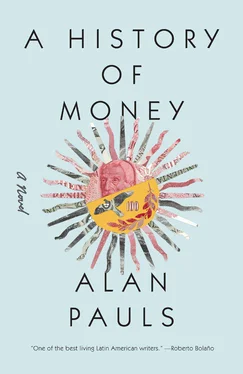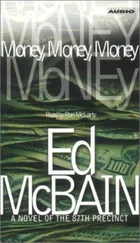How could he knock on his mother’s door in this state? And what would he wear? The ridiculous tattered sheepskin coat he hasn’t taken off since he got off the plane, even though it hasn’t been in style for more than ten years and it’s the middle of summer in Buenos Aires? And besides, he wouldn’t find her even if he did go to her place. She’s on the Uruguayan coast, half on vacation, half busy with the Beast, which already has two floors (not one, as stated in the plans), four bedrooms (not two), two small sea-facing terraces (not one), and a kidney-shaped swimming pool that takes up nearly all the space originally set aside for a garden complete with a little gazebo and flower beds, a tribute to the mansion in Mar del Plata that his mother’s husband has to scale down to two or three consolatory vases full of hydrangeas and relocate to one of the numerous halls that have recently sprouted from the project. Listening to her describe its growth over the phone, he can’t tell whether his mother is talking about a house or a living organism that’s obedient only to its own rules. It’s all excitement and alarm, and the call constantly threatens to cut out. Expenses, cash, bills, and more bills: a bottomless pit, which, incidentally, he knows about all too well — but the house is splendid, a strange green cube that imposes a certain rigor on a landscape colonized by chalet kitsch. No, he tells her: he won’t go see her right now — however much he’d like to catch the architect red-handed, expose him once and for all; he’s always suspected the worst of him, and particularly since discovering that he makes his living as a professional rugby coach and only dusts off his degree certificate when his mother and her husband, who meet him at a party, confess to him that they’ve finally decided to do something with the four hillside plots they own. He would go, but he’s only just got back to Buenos Aires and he has to sort everything out, find a job of some kind. Europe’s expensive, he doesn’t have much money left — and then he’s interrupted by a volley of maternal laughter. “What’s the problem?” she says: “Give it to your father, he’ll put it to work for you!”
It’s strange. His love life falls apart in the space of a few months, and he doesn’t shed a single tear. Until the day he goes to the bank to close the safe deposit box he used to share with his ex-wife (box two, unit three), which in fact he still shares, as demonstrated by the two matching keys he gives back and her signature below his on the record card like a miniature electrocardiogram. They go in, through two sliding, prisonlike grille doors, and when the woman who works for the bank asks him to open the metal box to confirm that it’s empty, a necessary stage in the process of giving it up, his knees suddenly go weak, and he only avoids falling over by putting a hand on the woman’s delicate shoulder while she looks at him in consternation. Sitting on the edge of the seat that’s hurriedly brought to him — one of the high, uncomfortable stools he sometimes used to sit on while depositing or withdrawing something from the box, whenever he found himself suddenly drawn to the two tiny, red, padded chests that appeared at the bottom, and opened them and sat for a while contemplating the modest, slightly childlike beauty of the two pieces of jewelry his ex-wife loved like nothing else in the world — sitting there on the stool, he starts crying openly and at length, and noisily, howling like a beaten animal, and his tears fall and hit the bottom of the empty box and shatter into a thousand microscopic shards, a thousand watery diamonds that belong to him, that in fact are him, but which will stay there forever, locked away in that little flattened coffin.
Closing the account is even more agonizing, and he has to come back several times. There’s a missing signature, he forgets his ID, he’s just been sent some money that hasn’t been credited to the account yet. Every time he pushes the glass door open and walks into the bank, he feels his chest contract in a spasm of pain. It doesn’t surprise him the first time, when he sits opposite the account manager he’s been seeing forever and tells her that he’s decided to close the account, and after listening to the full repertoire of possible alternatives with which she tries to change his mind — all of them written in angry red in her client-retention manual, and all formulated with equally suspicious clarity and benevolence — he hears his voice faltering and finds himself confessing the only thing he promised himself he wouldn’t admit even under torture: that they’ve split up, that it doesn’t make sense to have a shared account any longer. The next visits are more difficult. And yet the bank isn’t the first crime scene he’s returned to. He’s drunk in the bars he used to meet his ex-wife in and smoked in the cold in the forbidding square where he grabbed her and kissed her against a tree, inexcusably grazing her elbows on the bark. He’s already been caught alone and with his guard down by songs they used to listen to together, friends used to seeing them together, smells or urges that only make sense, that he’d only smell or pursue if he were with her. He’s not indifferent to any of these blows, but their effect never amounts to more than an agreeable sense of déjà vu, like something you’d experience in a museum of romance; they’re more like souvenirs or a form of preservation than stones sent from the beyond to chip the glass cube in which he’s trying to catch his breath. The impersonal atmosphere of the bank, on the other hand, the fluorescent strip lighting, the dirty upholstery on the seats, and the employees’ uniforms, which always fit badly and are covered in stray threads, not to mention the condescension they’ve always treated him with (given how insignificant a client he is), the lines he’s forced to stand in, the number of times he’s called without anybody answering, and the silent, daily swindle they subject him to: all of the most insipid and abhorrent elements of this place they seldom visited together (“Everybody should go to a bank at least once in their life. To rob it,” she liked to quote, blowing the smoke from an invisible 1873 Colt Peacemaker), and which he’s come back to now to take his leave, come together and suddenly form a world, a kind of unique, poisonous, palpable atmosphere, and mere contact with it is enough to expose him, the imperturbable man, to the elements, leaving him so defenseless that the faintest evocation of his former life could kill him.
He’s waiting in line one afternoon, probably for the last time, holding the handful of signed, sealed documents that will set him free — at least from this bank, or from this branch, or from this love that he so underestimated. He’s brought something to read. He likes the shield of arrogant indifference a book erects between him and the world, especially when he senses a queue agitator nearby, the type of person that sighs, raises their weary eyes to the ceiling, complains, seeks complicity, wishes the most hellish punishments on the bank and its employees, and when it’s their turn stands in front of the window and slides their check or their bill forward as politely as a geisha. He’s reading, or rather indolently skating over, a page with the right corner folded down — a sign that this isn’t the first time he’s paused on it in passing — on which a young disciple whose abilities have abandoned him announces his own radical powerlessness and surrenders before his master, thanking him for everything he’s done for him, everything he’s given to him, and the truths he’s enabled him to understand, but asking him to forget him forever, when the line advances two spaces and the back of a gleaming head of straight, jet-black hair — which from his position three people back he assumes is a wig — appears in front of the window, and the employee serving it checks something on a card and then raises her eyes toward it and forms the fateful phrase he never imagined he’d hear, the only one he should have expected to hear: “Box two, unit three.” His box, with his emptiness and his tears trapped inside.
Читать дальше












